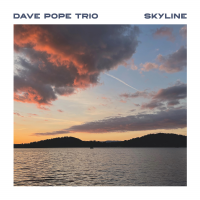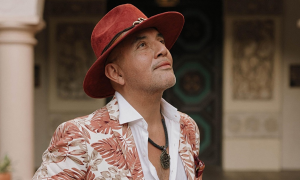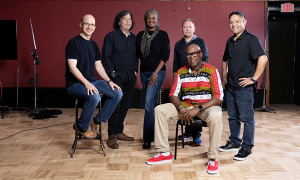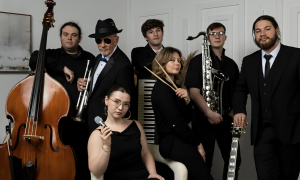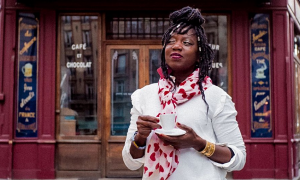Home » Jazz Articles » Take Five With... » Take Five With Saxophonist / Composer Wataru Uchida
Take Five With Saxophonist / Composer Wataru Uchida

About Wataru Uchida
Wataru Uchida is a saxophonist and composer who has been leading jazz projects in New York City since 2003. He studied saxophone performance and composition with
Chico Freeman
saxophoneb.1949
In 2001, Wataru worked as a teaching assistant of Rory Stuart's rhythm analysis class at New School University Jazz & Contemporary Music program.
In 2010, Wataru released his first CD Blue Morpho, recorded with NY-based Brazilian jazz artists,

Romero Lubambo
guitarb.1955

Helio Alves
pianob.1966

Nilson Matta
bass, acousticb.1949

Baden Powell
guitar, acoustic1937 - 2000
In 2015, Wataru recorded his original tunes with Abelita Mateus, Itaiguara Brand?o, and Vanderlei Pereira, and published the album, Predawn Shenanigans Club. The album has several tunes with rhythmical approaches applying odd meters to Brazilian rhythmic formulas.
In 2018, Wataru published a vinyl album, The Heart Intact, featuring eight of his original jazz compositions. The music was recorded on open reel tapes and mixed from those tapes to stereo tapes, with no computer involvement. The rhythm section included

Noah Haidu
piano
Kenny Davis
bassb.1961

Mark Whitfield, Jr.
drumsIn 2024, Wataru released the album On a Journey Ailing / Tabi ni Yande, recorded by a unique trio without drums featuring

Fima Chupakhin
piano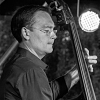
Oleg Osenkov
bass, acousticWataru has performed at Birdland, Jazz Standard, and Schomburg Center for Research in Black Culture in New York, supporting Tocho Swing Beats Jazz Big Band, the oldest jazz big band in Japan.
On May 15, 2010, Wataru performed at the Museum of the City of New York, leading his quintet with the select Japanese jazz performers in New York, as a part of major diplomatic events that celebrated 150 years anniversary of Japan-U.S. trade.
In 2018, Wataru joined a recording project of The Paul Sanwald Quartet. After the work, he performed at Bird & Beckett Books and Records in San Francisco and Lancaster Cultural Center in South Carolina for the album-release celebration.
In 2014, Wataru won a film scoring award for a short film. It was New Vision & Voice Craft Award 2014 Best Original Score by Maurice Kanbar Institute of Film & Television.
Instrument
Tenor saxophone.Teachers And/Or Influences?
Originally, I was a trombone player. I switched to saxophone, and I studied with Chico Freeman. He is from Chicago and influenced by
Gene Ammons
saxophone, tenor1925 - 1974

Von Freeman
saxophone, tenor1922 - 2012

Muhal Richard Abrams
piano1930 - 2017
To learn harmonic structure, I took classes in advanced reharmonization with LeeAnn Ledgerwood. I call her "A Witch Of Reharmonization." I think she goes as far as

Richie Beirach
pianob.1947
My first recording project with Nilson Matta was such a big lesson to study and practice on Brazilian rhythm. Plus, I had more than 40 small gigs with Abelita Mateus on keyboard. I don't think there is any better learning process than performing with such an astonishing Brazilian pianist. I studied pandeiro with Ze Mauricio. Also I joined Samba New York and played pandeiro and tambourine. I also joined Brazilian percussion classes by Fernando Saci. He explains the connection between Brazilian rhythmic formulas and African rhythms with demonstrations.
Your Sound And Approach To Music.
My approach to music changed drastically around the time of the pandemic. Before COVID-19, I was consistently releasing albums every three years. However, the tunes I wrote in 2021 were so bad that I couldn't even start a recording project. It wasn't due to depression or anything like that; I was stuck in a rut, trying to develop the structure of my compositions within a small box of limited ideas while I wanted to create pieces that had their own life. Since 2022, I've been working on new harmonic maps with a bit more open concepts. My new compositions often modulate technically, but to me, they sound like they're in just one key after working for a year. These days, I use a big whiteboard and colorful markers to develop my ideas. For two years, I didn't listen to any jazz. Instead, I focused on the sounds of nature—the sea, the forest, the wind, and especially the rain, and I allowed myself to listen to world folk music including traditional Japanese music like Gagaku.When it was raining or sunny, I'd clear my mind outside and record whatever sounds came from my saxophone. This approach was something Chico Freeman taught me as an option for writing originals.
In my rehearsal studio, I practiced on the drum set to transition between different subdivisions and play them together, like basic beats on the bass drum, triplets on my right hand, and quintuplets on my left hand. This practice led me to a strong urge to listen to bugs buzzing and birds chirping. I realized that absorbing these odd tuplets helped me tune into the voices of creatures and the sounds of nature.
Matching a harmonic map with a melody was the most sensitive part, like building a miniature ship in a bottle with my eyes closed. Surprisingly, when I let go of specific melodies or harmonic maps and just imagined a scene, a piece would form in my head. But then another issue arose: my saxophone sound and tonguing for straight-ahead jazz weren't suitable for creating these sonic pictures. So, I had to change my tonguing, sinus chamber control, vibrato, and even my mouthpiece and reed setup. I spent the whole of 2023 on these adjustments.
After two years of full commitment to my metamorphosis, I chose two musicians from my neighborhood in Brooklyn, New York. I needed artists who could break free from conventional automatism and think beyond the charts. My pianist and bassist are originally from Ukraine and Russia. I believe that, while we inherit traits from our parents physically, we are products of our cultural heritage mentally. Whether they liked it or not, they came from a region with strong traditional music, and they were the perfect fit for this project.
Chico Freeman taught me that there are three steps to the experimental process:
- Write tunes, including those that come out naturally without logical explanations.
- Choose the right musicians for the nature of the written music and see what emerges from the group context.
- Choose the right audience for the music and observe what kind of chemistry happens.
Your Teaching Approach
As an African American tradition, jazz musicians added a variety of articulations to saxophone. Besides longtime exercise, I spend time with such fundamentals. I explain how to apply Bebop phrasing to Hard bop and Bossa nova phrasings with precise rhythmical approaches.My saxophone tips are available on Youtube. There are 32 videos for beginners. On Zoom, I have taught students in Germany, Brazil, India, Australia, Canada, and some other states in the U.S.
Your Dream Band
It's Led Zeppelin. They lived together on a farm and spent time creating original music. Their band name is the sub-genre of their music. It's ideal, isn't it?Road Story: Your Best Or Worst Experience
I went down to the South as one and only horn player with color in a jazz band with three white rhythm section players. But the great thing was that our music ruled. So, after all, it was another wonderful experience.Favorite Venue
Terra Blues is where I bring my friends from other places. Sorry, it's a blues venue.Your Favorite Recording In Your Discography And Why?

Baden Powell
guitar, acoustic1937 - 2000
You can hear his respect for Afro Brazilian music in his sound. Each note he plays tells something. It's the most difficult thing for a guitarist, isn't it?

Led Zeppelin
band / ensemble / orchestrab.1968
20th century really was the time for drums. I feel sorry for the youth who don't have any idea of rock drums.
What Do You Think Is The Most Important Thing You Are Contributing Musically?
I grew up in a dysfunctional family, and music was my only savior during childhood. I realized how powerful music can be. But recently, I've come to understand how fragile music can feel compared to the sounds of nature. And I started hearing something essential in my head, like sounds of appreciation and affirmation.Recently, a friend of mine, Mitch Van Dusen, kindly listened to my entire album "On A Journey, Ailing" and texted me, "It's not the notes you played but how you played them... It felt like you were telling a story of your spirit." At first, I wondered if it was just a courtesy compliment, but it seems he genuinely meant it.
Have you ever listened to "Mercy Mercy Me" by Chico Freeman and Von Freeman? Chico played the soprano sax so smoothly, like a dandy gigolo, and then his father, Von Freeman, came in with his solo on tenor sax, sounding like someone who didn't know what to do but sob. That's the biggest expression in this form of music, in my opinion. My expression is intentionally small, and subtle, while theirs is huge and powerful. But essentially, I'm trying to find my voice to share my history of emotions with other musicians, and the sound of the band brings listeners to a moment of catharsis.
I think our goals are the same. Von Freeman lived through intense racial discrimination, trembling with anger but supported by love. His history of emotions is like dynamite with a human touch. Mine comes from tranquility in my mind and appreciation for nature. Both ways, we dedicate ourselves to people, and I believe in that.
A lot of my neighbors say they love music but jazz isn't their thing because it doesn't touch their hearts. I don't simply agree with them. But when music lovers say this genre doesn't speak to them, can we just blame the listeners? I don't think so.
Did You Know...
That there still was a recording studio where you can record your music on magnetic tapes without a computer? In 2018, I had my analog recording on open reels at The Bunker Studio in Brooklyn, New York.And you may think that an analog recording project to press LP costs you so much more than computer recording to print CDs. That is not true. The extra cost of the analog project is buying open reel tapes. And printing LP jackets costs you so much more than you expect. But the good part is that I saved a lot of money for mixing because the mixing process was so much faster than those computer recordings I experienced before. The original sound on tapes was very rich and a mixing engineer didn't have to use too many effects. It was simply balancing the volume and panning instruments was whatever I wanted because it was not compromised like a CD project. You may know that engineers usually put drums and bass in the middle to get bass drum and bass sound equally from both speakers for a CD project. But you don't have to do that to press vinyl.
You know recent jazz recordings tend to sound like players are playing in a bathroom, right? That's what engineers do with reverbs. And music comes out as ostentatious as strippers' make up. We should stop doing that.
Music You Are Listening To Now:
Usually, right after you go over recording, mixing, and mastering an album, you want to take a break from the music you recorded, right? I'm still listening to my album, On A Journey, Ailing. I have published four albums. But it's the very first time like that.Desert Island Picks:
I should be listening to the sound of nature when I die alone. And that would be the most luxurious moment. The sound of wind, sound of waves... Man-made sounds won't be any better than them.What Is In The Near Future?
I will be promoting my album, On A Journey, Ailing. And I will have some local gigs playing some Brazilian tunes by
Caetano Veloso
guitarb.1942

Carlos Lyra
guitar1933 - 2023

Milton Nascimento
guitar and vocalsb.1942

Djavan
guitarb.1949

Joao Gilberto
vocals1931 - 2019

Egberto Gismonti
guitarb.1947

Hermeto Pascoal
multi-instrumentalist1936 - 2025

Antonio Carlos Jobim
piano1927 - 1994
Paul Sanwald
bassIf I Weren't A Jazz Musician, I Would Be A:
Ocean biologist, like Jacques Cousteau. If you don't know him, check out the movie The Life Aquatic with Steve Zissou! It's a shame that I'm not an ocean biologist. I always want to talk to dolphins.Tags
Wataru Uchida
Take Five With...
Chico Freeman
New York City
Birdland
Jazz Standard
Romero Lubambo
Helio Alves
Nilson Matta
Cafe Da Silva
Ze Mauricio
Junior Mance
Chicago
Gene Ammons
Muhal Richard Abrams
Richie Beirach
Stanley Turrentine
Paris Blues
Baden Powell
Londel's Supper Club
Tokyo
Comments
PREVIOUS / NEXT
Support All About Jazz
 All About Jazz has been a pillar of jazz since 1995, championing it as an art form and, more importantly, supporting the musicians who make it. Our enduring commitment has made "AAJ" one of the most culturally important websites of its kind, read by hundreds of thousands of fans, musicians and industry figures every month.
All About Jazz has been a pillar of jazz since 1995, championing it as an art form and, more importantly, supporting the musicians who make it. Our enduring commitment has made "AAJ" one of the most culturally important websites of its kind, read by hundreds of thousands of fans, musicians and industry figures every month.








 Buy Now
Buy Now

